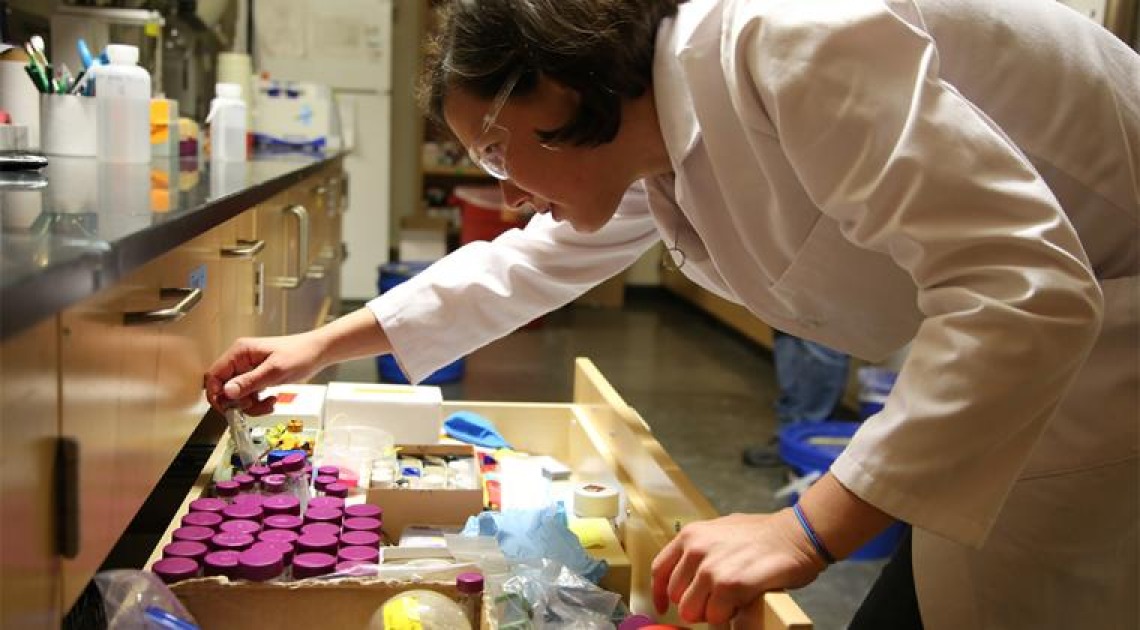TLA development fund helps inventors prepare technologies for impact

Colleen Janczak, assistant research scientist and Scintillation Nanotechnologies co-inventor (Photo by Paul Tumarkin/Tech Launch Arizona)
There are two questions that Doug Hockstad, assistant vice president of Tech Launch Arizona, wants to ask every University of Arizona researcher: What innovations are stemming from inventions you create through your work and do you want to see them generate positive impact in the world?
If they answer yes, TLA – the University of Arizona office that commercializes inventions stemming from research – and Hockstad have some good news.
"Not only do we have the professional staff to help identify and patent these inventions, we have funding to help researchers demonstrate and prepare technologies for the transition from bench to the world," he says.
Last year, TLA awarded $776,732 for asset development projects, which are inventions that aren't quite ready to attract licensees or investors. All told, TLA granted 16 new awards in fiscal year 2019, bringing the total number of projects funded since 2015 to 91.
The asset development fund provides $1 million each year for such awards, which are granted based on a collaborative application process that brings together University of Arizona inventors, TLA staff members and technology, industry and intellectual property experts. Together they evaluate applications for impact potential and "technology readiness level," then develop a project plan and budget to ready it for license to a company that can take it forward.
The size and scope of projects vary greatly, but awards generally range from $20,000 to $50,000 per project.
Gus Loaiza, senior accountant with TLA, manages the program. One of the key elements, he says, is how the process brings together University inventors and community experts to identify and evaluate technologies with the greatest impact potential.
"It's fascinating to be a part of this kind of collaboration – working with professors and community partners, getting everyone's perspective on what's best for this tech," he says. "When the invention is licensed and you see an available product at the end of the day, you know it's come full circle, that we funded a project that made it to market and is living and breathing on its own."
Over the years, these projects have hailed from numerous fields and campus entities, including the College of Engineering, the James C. Wyant College of Optical Sciences, the College of Agriculture and Life Sciences,the College of Medicine – Tucson, and other academic and nonacademic colleges and units.
Colleen Janczak, assistant research scientist in the Department of Chemistry and Biochemistry, and Craig Aspinwall, professor in the Department of Chemistry and Biochemistry and member of the BIO5 Institute, received two awards to develop a nanomaterial technology to provide a deeper understanding of complex biological processes, opening possibilities for more precise diagnosis and treatment of disease. When the invention was shown to be viable through asset development projects, the team formed a startup, Scintillation Nanotechnologies, and licensed the invention from the University.
"The asset development award from TLA allowed us to focus our efforts and move from an idea to a product that can be produced at a scale practical for commercialization," Janczak said.
In another project, University Libraries associate librarians Jason Dewland and Yvonne Mery developed a concept for a new web-based e-learning platform. Asset development funding provided the resources to build the software, which the University licensed to the startup Sidecar Learning.
"The funds we received from AD allowed us to develop our initial prototype," Mery said. "From there we were able to build out the beta version of the platform and go to market with it. We now have about 10 paying customers."
Through its process, the office assesses each invention, examining both the intellectual property and market landscapes to establish its commercial potential. Most of the time, these technologies are early-stage and need further development to make them attractive for market adoption.
"The funding is awarded to a variety of projects, but mainly it's based on the potential to get the technology out into the world via a license, either to a startup or an existing company," Hockstad said. "Overall, it's about maximizing the opportunity for each invention to impact lives."
As described in its latest annual report (PDF), TLA launched 11 startups and licensed 96 technologies in fiscal year 2019, moving ideas that started as research out into the world in hopes of improving lives, creating jobs and making a better world.
Faculty and graduate students interested in learning more about asset development funding should contact TLA online or call 520-621-5000.
A version of this story originally appeared on the Tech Launch Arizona website.

